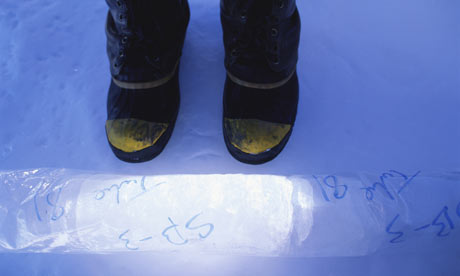Met Office to release records that show global temperature rise
Records from nearly 2,000 stations worldwide may cool debate over leaked emails from University of East Anglia
- Alok Jha, guardian.co.uk, Monday 7 December 2009

A team of glaciologists using an solar-powered drill to make cores of ancient ice atop 6542 meter Mt. Sajama in Bolivia. Photograph: George Steinmetz/Corbis
In the emails, the scientists at UEA's Climatic Research Unit (CRU) apparently discussed attempts to inhibit access to emails and data that had been requested under the Freedom of Information Act. The CRU has been bombarded with requests to release data – which underpin the so-called HadCRUT temperature record – over many months. But it had always responded that it was not possible make all of it public because permission was needed from the numerous institutions around the world that had collected it.
In his address to the UN climate talks in Copenhagen which opened yesterday, the head of the Intergovernmental Panel on Climate Change (IPCC), Rajendra Pachauri, said that he suspected that the email hack was an attempt to undermine his organisation, which reports to world governments on the science of climate change.
"Given the wide-ranging nature of (climate) change that is likely to be taken in hand, some naturally find it inconvenient to accept its inevitability," he told the conference. "The recent incident of stealing the emails of scientists at the University of East Anglia shows that some would go to the extent of carrying out illegal acts, perhaps in an attempt to discredit the IPCC."
But the chief negotiator for Saudi Arabia, one of the world's biggest oil exporters, told the conference that the emails would impact on the conference. "The level of trust is definitely shaken, especially now that we are about to conclude an agreement that ... is going to mean sacrifices for our economies," said Mohammed al-Sabban.
Last week, UEA announced an independent inquiry into the leak and conduct of the scientists, who deny any suggestion that they manipulated or withheld data.
Now the Met Office is releasing the raw data for around 1,900 monitoring stations spread roughly evenly around the world in an effort to silence critics who say that the lack of transparency was an act of subterfuge on the part of the scientists. The HadCRUT record of global temperatures is one of three major analyses of global temperature that are part of the
scientific information used in the assessment reports of IPCC – the UN body that reviews climate change literature and reports back to world governments. Tomorrow more than 150m readings on temperature – going back more than 100 years – will be made public.
"The important thing to know about the problems surrounding the UEA is that lots of groups around the world have done similar things to the scientists there, by looking at similar data and using independent methods and they've all been showing similar results, all approached from different directions," said Paul Hardaker, chief executive of the Royal Meteorological Society. "That gives us some confidence that the information we're getting from the data is well-founded."
The data to be released by the Met Office come from monitoring stations around the world that have been designated for use in recording climate data by the World Meteorological Organisation and show changes in mean temperature on a global scale over land. Some monitoring stations have been running for 150 years. The Met Office said the data show that global average land temperatures have risen.
The full record uses data from 5,000 monitoring stations and the Met Office said it would make that data public too once it had permission from relevant owners around the world.
Myles Allen, a climate scientist at Oxford University, said the data set was an important one for climate models. "My particular area of research is detecting climate change and attributing causes. Fundamental to that is accurate records of what has actually happened."
But he pointed out that the measurements have always been available to bona fide researchers. "Loads of people have scrutinised the data and the way it was generated. It's not as if this data has been hidden from scientific scrutiny until now," said Allen. "Nevertheless, since people can score political points by saying the data's not available, it's politically important to make it as transparent as possible."
The Met Office stressed that the information released today does not form a new temperature record. The full HadCRUT temperature curve, which has been peer-reviewed, remains the established record, along with Nasa's Goddard Institute for Space Studies' records and those of the National Climatic Data Centre in the US. The Met Office said tomorrow's information release was part of a policy to release as much of its temperature record information into the public domain as possible. The organisation also plans to publish the computer code that aggregates the individual station temperature records to build the global map.
Link: http://www.guardian.co.uk/environment/2009/dec/07/met-office-temperature-records-climate-change







No comments:
Post a Comment